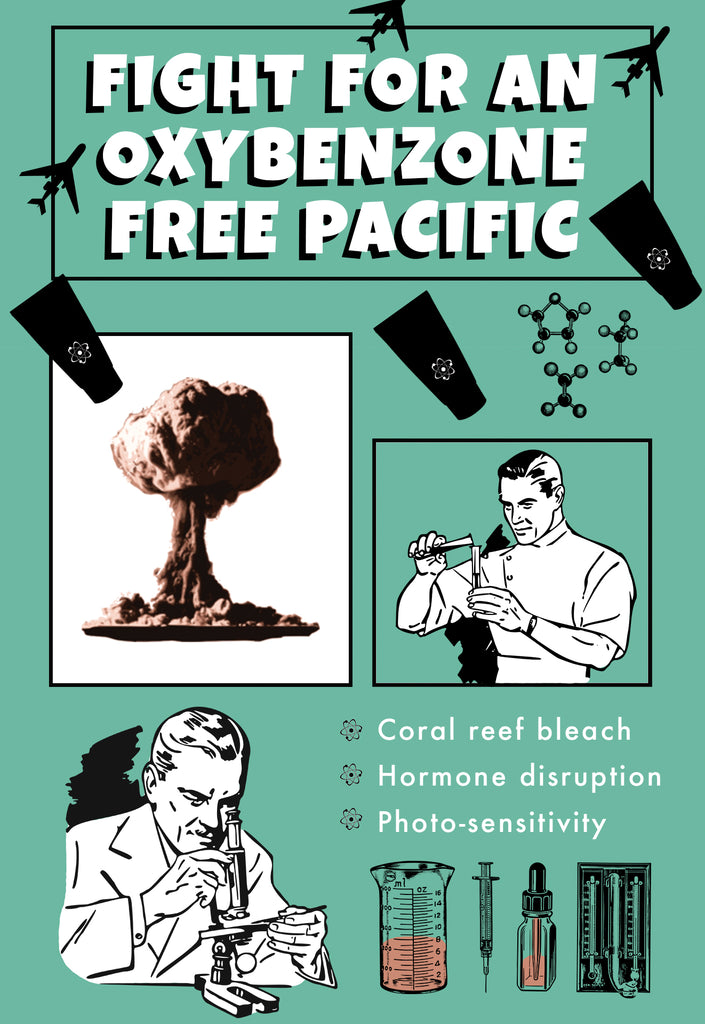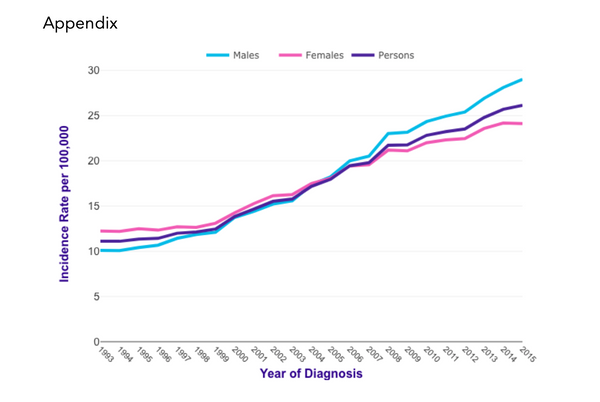Make NZ Oxybenzone Free

To paraphrase Sir David Lange ‘ we can smell the Oxybenzone on your breath from here…’ or something like that.
Last May, in a bid to stop the bleaching and destruction of its precious reefs, the US state of Hawaii announced it was banning sunscreens that use the ingredient Oxybenzone (1). Triumph & Disaster believes New Zealand should follow suit, we want to declare Aoteoroa ‘Oxybenzone Free’!
Oxybenzone is an organic compound used in sunscreens because of its ability to absorb UVB and short UVA rays, it may also be referred to as Benzophenone-3.
Oxybenzone has been shown in studies to penetrate the skin and causes photo-sensitivity meaning easier sun burning when exposed to sunlight (2).
Studies from the national institute of dermatology of Colombia have shown these results create allergic skin conditions in humans (3).
A recent Swedish study has shown that pregnant mice exposed to “environmentally relevant” levels of Oxybenzone led to neurotoxicity, altered levels of oestrogen receptors and changes in the gene functions of the foetuses.(4)
The Centre for Disease Control and Prevention (USA) concluded a study in 2008, showing 96.8% of urine samples that had been collected and examined were shown to contain Oxybenzone (5).
Studies such as these are leading many toxicology experts to air serious concerns about the potential links between Oxybenzone use and hormone disruption, increased allergy risk and even cell damage in humans (6).
In short, Oxybenzone is a ‘shocker’ and only exists in our lives because big (or lazy) cosmetic companies want to make cheap, easy products to sell us.
Since Oxybenzone’s introduction in the 1980s, melanoma rates have climbed unabated (7), coral reefs have become bleached and degraded and children everywhere have been exposed to Oxybenzone under the guise of ‘safe effective sunscreens’, some even promoted by cancer societies.
But we ask, where is the evidence ‘for’ Oxybenzone?
Easy, yes, Cheap, yes, but effective and Safe? We don’t see it.
Much like those who have argued climate change is a vicious rumour, tobacco is harmless and Fluorocarbons are just fun little gases. The cosmetics industry lead by dermatologists and industry-paid scientists continue to argue the risks are negligible and the science against Oxybenzone unproven.
Triumph & Disaster would argue there are already enough studies to show the risks are real and that in fact, it is the science ‘proving the safe use’ of this ingredient that is both lacking and unproven.
Moreover, there are great alternative ingredients available with proven safety records and efficacy that make Oxybenzone entirely redundant.
Triumph & Disasters sunscreen ‘No Dice’ is Oxybenzone free, making it reef and child safe. And there are many other brands on the market who have done their research and made safe considerate products as well, we salute them. But all those others, hiding behind ‘industry experts or ignorance we say wake up and get on board, it’s time for an Oxybenzone free NZ – let’s put people first.
Tell us what you think....
References
- https://www.theguardian.com/travel/2018/may/03/hawaii-becomes-first-us-state-to-ban-sunscreens-harmful-to-coral-reefs
- https://www.ncbi.nlm.nih.gov/pmc/articles/PMC2014387/
- https://onlinelibrary.wiley.com/doi/abs/10.1111/j.1600-0781.2006.00212.x
- https://stream2sea.com/good-news-bad-news-on-oxybenzone/
- http://www.ewg.org/skindeep/ingredient/704372/OXYBENZONE/#
- https://www.thelancet.com/journals/lancet/article/PIIS0140-6736(05)62032-6/fulltext
- https://www.cancerresearchuk.org/health-professional/cancer-statistics/statistics-by-cancer-type/melanoma-skin-cancer/incidence#heading-Two
Appendix:

Further reading;
https://www.huffpost.com/entry/oxybenzone-chemical-sunscreen_n_5aeb38b0e4b0c4f1931ffce0
1 comment
Sounds like it’s easy for them, cheap AND makes us need their sunscreen EVEN MORE because it makes us photo-sensitive! BA*TARD*
 Skip to content
Skip to content













